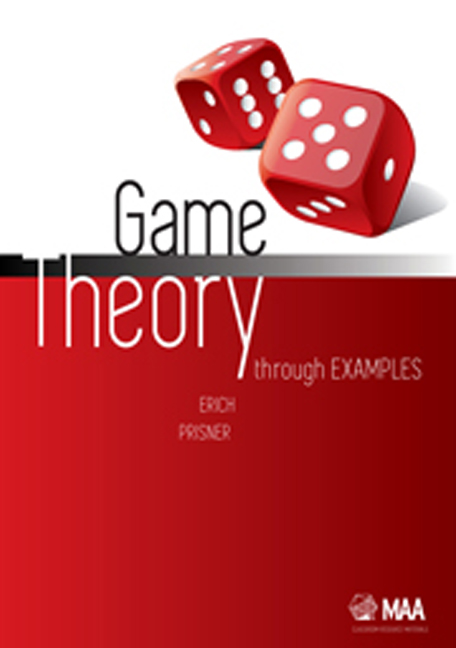Book contents
- Frontmatter
- Contents
- Preface
- 1 Theory 1: Introduction
- 2 Theory 2: Simultaneous Games
- 3 Example: Selecting a Class
- 4 Example: Doctor Location Games
- 5 Example: Restaurant Location Games
- 6 Using Excel
- 7 Example: Election I
- 8 Theory 3: Sequential Games I: Perfect Information and no Randomness
- 9 Example: Dividing A Few Items I
- 10 Example: Shubik Auction I
- 11 Example: Sequential Doctor and Restaurant Location
- 12 Theory 4: Probability
- 13 France 1654
- 14 Example: DMA Soccer I
- 15 Example: Dividing A Few Items II
- 16 Theory 5: Sequential Games with Randomness
- 17 Example: Sequential Quiz Show I
- 18 Las Vegas 1962
- 19 Example: Mini Blackjack and Card Counting
- 20 Example: Duel
- 21 Santa Monica in the 50s
- 22 Theory 6: Extensive Form of General Games
- 23 Example: Shubik Auction II
- 24 Theory 7: Normal Form and Strategies
- 25 Example: VNM POKER and KUHN POKER
- 26 Example: Waiting for Mr. Perfect
- 27 Theory 8: Mixed Strategies
- 28 Princeton in 1950
- 29 Example: Airport Shuttle
- 30 Example: Election II
- 31 Example: VNM POKER(2, r, m, n)
- 32 Theory 9: Behavioral Strategies
- 33 Example: Multiple-Round Chicken
- 34 Example: DMA Soccer II
- 35 Example: Sequential Quiz Show II
- 36 Example: VNM POKER(4, 4, 3, 5)
- 37 Example: KUHN POKER(3, 4, 2, 3)
- 38 Example: End-of-Semester Poker Tournament
- 39 Stockholm 1994
- Bibliography
- Index
23 - Example: Shubik Auction II
- Frontmatter
- Contents
- Preface
- 1 Theory 1: Introduction
- 2 Theory 2: Simultaneous Games
- 3 Example: Selecting a Class
- 4 Example: Doctor Location Games
- 5 Example: Restaurant Location Games
- 6 Using Excel
- 7 Example: Election I
- 8 Theory 3: Sequential Games I: Perfect Information and no Randomness
- 9 Example: Dividing A Few Items I
- 10 Example: Shubik Auction I
- 11 Example: Sequential Doctor and Restaurant Location
- 12 Theory 4: Probability
- 13 France 1654
- 14 Example: DMA Soccer I
- 15 Example: Dividing A Few Items II
- 16 Theory 5: Sequential Games with Randomness
- 17 Example: Sequential Quiz Show I
- 18 Las Vegas 1962
- 19 Example: Mini Blackjack and Card Counting
- 20 Example: Duel
- 21 Santa Monica in the 50s
- 22 Theory 6: Extensive Form of General Games
- 23 Example: Shubik Auction II
- 24 Theory 7: Normal Form and Strategies
- 25 Example: VNM POKER and KUHN POKER
- 26 Example: Waiting for Mr. Perfect
- 27 Theory 8: Mixed Strategies
- 28 Princeton in 1950
- 29 Example: Airport Shuttle
- 30 Example: Election II
- 31 Example: VNM POKER(2, r, m, n)
- 32 Theory 9: Behavioral Strategies
- 33 Example: Multiple-Round Chicken
- 34 Example: DMA Soccer II
- 35 Example: Sequential Quiz Show II
- 36 Example: VNM POKER(4, 4, 3, 5)
- 37 Example: KUHN POKER(3, 4, 2, 3)
- 38 Example: End-of-Semester Poker Tournament
- 39 Stockholm 1994
- Bibliography
- Index
Summary
Prerequisites: Chapters 8, 12, 16, 22, and 10.
In this chapter we look at this simultaneous game with randomness, and we discuss connections to games with nonperfect and incomplete information. This is a continuation of Chapter 10, where we saw that knowing in advance the maximum number of moves results in a disappointing optimal solution, where the player who will not have the last move will not even start bidding. What happens if the number of bidding rounds is finite but unknown? Or if the number of rounds is finite, but after every move the game could randomly end?
Possible Sudden End
In SHUBIK AUCTION, the player with the last move will bid and the other will pass immediately. What happens if we don't know in advance which player has the last move? Assume there is a maximum number of rounds, and assume that the game can terminate after each round with probability p. This makes the game fairer, more interesting, and, as we will see, more profitable for the auctioneer.
SHUBIK AUCTION(A, B, n, p) Two players, Ann and Beth, bid sequentially for an item, with bids increasing by increments of $10. The item has a value of A for Ann and B for Beth. The game ends if one player passes, i.e., fails to increase the bid, or after Ann and Beth complete the nth bidding round. There is a third way the game could end: after every bid, the game may terminate with probability p. After the game ends, both players pay their highest bids, but only the player with higher final bid gets the item.
- Type
- Chapter
- Information
- Game Theory Through Examples , pp. 169 - 175Publisher: Mathematical Association of AmericaPrint publication year: 2014



